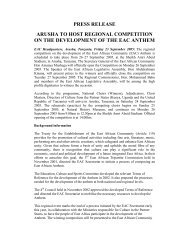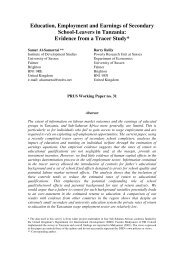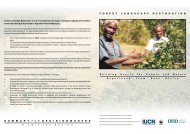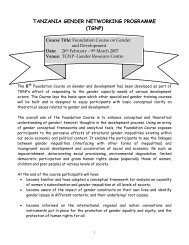The Girl-Child and Government Service Provision.pdf - Tanzania ...
The Girl-Child and Government Service Provision.pdf - Tanzania ...
The Girl-Child and Government Service Provision.pdf - Tanzania ...
- No tags were found...
You also want an ePaper? Increase the reach of your titles
YUMPU automatically turns print PDFs into web optimized ePapers that Google loves.
Table 2–1. Primary school buildings <strong>and</strong> furniture required vs. actual, 1999Type ofbuilding/furnitureRequirednumberActualnumberShortage(of units)Actual /requiredClassroomsStaff housesToiletsStoresTablesChairsCupboards99,278116,591168,92818,175208,383222,000127,93957,36726,79564,8145,51075,39780,13730,44241,91189,796104,11412,665132,986141,82797,49758%23%38%30%36%36%24%Source: Ministry of Education <strong>and</strong> Culture (2000)of toilet <strong>and</strong> water facilities is a serious concern, giventheir importance to ensuring basic health. This is particularlytrue for girls, most of whom begin menstruating whilein primary school (see Table 2–1).Community beliefs <strong>and</strong> practicesA number of community beliefs <strong>and</strong> practices affect girlchildeducation in <strong>Tanzania</strong>, including lack of parents’knowledge of the social <strong>and</strong> private benefits of education,limited roles for girls <strong>and</strong> women, differential treatmentof girls (for example, poor nutrition <strong>and</strong> health care), lackof economic <strong>and</strong> social opportunities for educated girls,early marriage <strong>and</strong> glorification of motherhood, femaleseclusion <strong>and</strong> sexual abuse/harassment, domestic violence,female genital mutilation (FGM), <strong>and</strong> inheritancepatterns.A study by K<strong>and</strong>usi (1999) found that approximately threemillion women (10 per cent) in <strong>Tanzania</strong> have undergoneFGM, mainly in Arusha, Dodoma, Kilimanjaro, Singida <strong>and</strong>Mara, <strong>and</strong> in a few places in Morogoro, Iringa, Lindi <strong>and</strong>Mtwara regions. Before this, girls have to celebrate a riteof passage ceremony, after which they are consideredadults. Psychologically the conferring of adult status canlead to educational tensions. <strong>Girl</strong>s can become frustratedwith the idea of staying in school, which is associated withchildhood, resulting in loss of concentration, poor performance,truancy <strong>and</strong> finally dropping out. It has also beenfound that FGM perpetuates early marriage, thereby causingmany girls to drop out.Educational barriers<strong>The</strong> poor educational environment for girls is characterisedby a lack or absence of parental <strong>and</strong> societal expectationfor girls to perform well, sexual harassment by maleteachers <strong>and</strong> other men outside schools, <strong>and</strong> inadequatephysical infrastructure (such as lack of water <strong>and</strong> sanitationfacilities). This environment contributes to practicessuch as early marriage, early pregnancy <strong>and</strong> dropping outof school. Lack of clean water <strong>and</strong> private toilet facilities(lack of doors) may particularly affect girls during menstruation.<strong>The</strong> lack of privacy <strong>and</strong> the unhygienic conditionsmay cause girls to stay home during this time, missingout on a number of school days each month.Stereotypical gender roles <strong>and</strong> prejudices against girls areoften perpetuated in school through textbooks <strong>and</strong> otherlearning materials, teachers’ attitudes <strong>and</strong> interaction withchildren in the classroom, designation of tidying <strong>and</strong> otherresponsibilities in school, <strong>and</strong> extracurricular tasks imposedon school children. A study on gender <strong>and</strong> educationrevealed that in developing countries as a whole,“textbooks transmit heavily stereotyped images of men<strong>and</strong> women, with women adopting low profiles <strong>and</strong> havingtraits of passivity, dependency on men, low intelligence <strong>and</strong>a lack of leadership” (Kuleana 1999).Many teachers maintain that girls are not as smart as boys.A 1997 study in Kenya revealed that both male <strong>and</strong> femaleteachers described girls as stupid <strong>and</strong> lazy <strong>and</strong> articulatedlower expectations for girls. A predominance of maleteachers (approximately 75 per cent) means that girls lack34 <strong>The</strong> <strong>Girl</strong>-<strong>Child</strong> <strong>and</strong> <strong>Government</strong> <strong>Service</strong> <strong>Provision</strong>
















